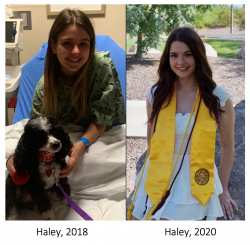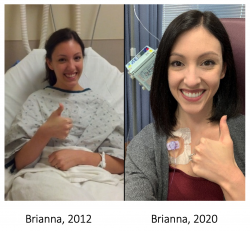Milestones are an exciting and challenging part of growing up. We all experience those “firsts” in adolescence – first date, first prom, first time behind the wheel of a car. Teenagers with chronic illnesses, however, experience a few more milestones than many of their peers. One of these milestones is transition, the change in the “driver’s seat” of healthcare from a parent or guardian of a pediatric patient to an adult patient, which usually occurs around age 18-21. The next milestone is transfer, the actual change in provider care, from a pediatric expert to an adult specialist. This change can be challenging as the patient learns to become the expert in their condition and the primary voice in their healthcare decision-making. Many patients feel as though they are leaving their pediatric team behind, which can bring its own challenges. Patients and families often form special bonds with their pediatric care team during the heightened stresses of diagnosis. The pediatric team, however, is never completely gone. Rather, the pediatric and adult care teams can become one team led by a confident and empowered young adult and their family.
Haley and Brianna are two adult patients who have Inflammatory Bowel Disease (IBD), a chronic illness that began as teenagers. They share their first-hand stories, discuss the transition process and offer tips to help prepare teens and families:
Haley Clark

Since I was thirteen, all of my experiences with doctors, medicine, and IBD were at Phoenix Children’s Hospital. It’s safe to say, Phoenix Children’s felt like a second home. After years of waiting for my Crohn’s to be in remission, I was encouraged to transfer to an adult provider when I turned 21. I wish someone would have prepared me for the culture shock you experience when transferring to an adult provider. After you spend countless hours in a children’s hospital, you get used to being the oldest in a clinic setting. However, when you transfer, no one tells you that you will quickly go from being the oldest to the youngest in the room. It was intimidating to see I may have something in common with someone almost triple my age. It made me feel as if my disease had intensified.
Reflecting on my emotions helped me through the transition process and reminds me what it means to be my own advocate. Being an advocate for yourself means engaging with your disease even when you feel overwhelmed. The biggest piece of advice I would give someone undergoing the transition process is to know your resources and supporters. Connect with other patients through events like support groups and camp. You may feel lost, vulnerable, and afraid in the adult world. However, utilizing your resources and supporters will remind you that you’re not alone. Before you transfer, it’s important to understand the basics of your diagnosis, such as history, treatments, and medical tests. Take time to learn about your health insurance and know what to do if you lose coverage. Although care may look different on the adult side, having a bright and optimistic attitude will positively impact your overall health and wellbeing.
Brianna Procopio, MSN, RN

I was diagnosed with Crohn’s disease when I was 15 years old. After countless hours in appointments, infusions, hospital admissions, and surgeries, my pediatric care team became my second family. I remember feeling excited for my next appointment so I could share my plans for college with my favorite gastroenterologist. I skipped down the halls of the pediatric floor to catch up with my favorite nurses. Even the radiologists, house keepers and cafeteria staff were a part of my family. The experiences I shared with my pediatric care team helped me to develop a positive relationship with my disease. With them, Crohn’s was a part of my life, but I felt like the rest of me was important, too. You can imagine the heartbreak I felt when my doctor told me it was time to start looking for an adult provider after high school.
The first time I stepped foot into my adult provider’s office, I knew something was different. There were no zoo animals on the walls. Children’s books were replaced with adult health magazines. Instead of Pixar movies, the local news mumbled quietly in the background. My new provider felt like a stranger, but I was open to sharing my history and learning what care with her would be like. However, my openness was tested when she inquired about a current fistula (complication of Crohn’s disease) I was dealing with. “You don’t need me to look at that, do you?” It had taken me years to get comfortable with my disease and I immediately felt defeated. However, this experience played a huge role in the health advocate I am today and tested the strength I had built with my pediatric family. After a few more appointments with this provider, I ended up switching until I found the perfect fit for me. I now have a great relationship with my adult care team and view them as an extension of my pediatric family. My experience has inspired me to help other patients through the transition process as the Nurse Coordinator for the IBD Clinic at Phoenix Children’s Hospital.
Transition of care will look different for everyone. While some feel comfortable with their first adult provider, others change a few times before finding the perfect fit. It’s important to keep an open mind and remember that building a relationship with a new provider takes time. While change can be scary, an adult provider has the tools to help patients meet new milestones as a young adult. Both Phoenix Children’s Hospital and adult care teams will support patients and families through the transition process and help to make the transfer of care a seamless and empowering experience.
Transition Tips:
- Start preparing now
- Ask questions
- Participate in decision-making
- Communicate with your team
- Become the expert in your care
- Understand your insurance
- Connect with support systems
- Advocate for your needs and wants
- Connect with a mental health specialist
- Give back to your community
Helpful Resources:
- Transition Checklist
- Preparing for Adult Care
- Crohn's and Colitis Foundation Transition to Adult Care
- IBD Parent Working Group
- IBD Young Professionals Group
- Camp Oasis!
- Helpful apps for transition:
- Secure Health Passport app
- Pediatric to Adult Care Transition app
